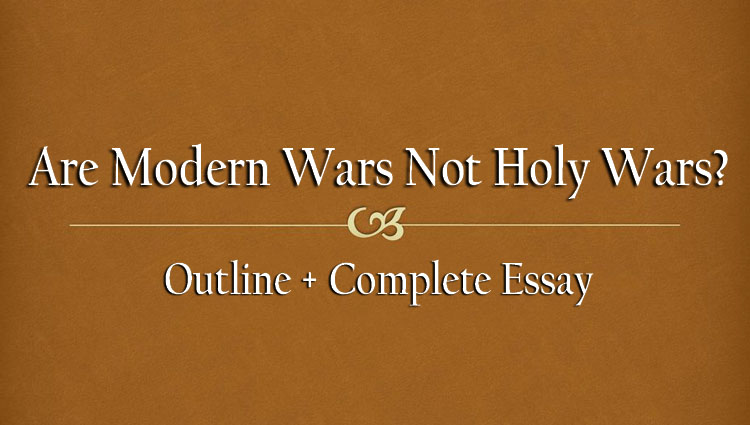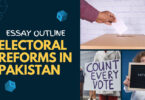Are Modern Wars Not Holy Wars? (Complete Essay)
Essay Outline
1) Introduction:
The contemporary era- that is characterized by an increasingly complex world order- has seen a paradigm shift from holy wars to wars that have geo-economic and geo-political reasons at their core. Even the religious wars have other issues at their heart.
2) Framing the Issue- Defining the Key Variables:
2.1) Holy Wars: wars that have a religious dimension to them
2.2) Modern wars: wars fought in the contemporary world due to a host of reasons other than the religious factor
3) How Modern Wars Are Not Holy Wars?
3.1) Proxy warfare as means to weaken rival states
Cases in point: * Indian involvement in igniting separatist tendencies in Balochistan
The Syrian civil war
3.2) War for the right to self determination
Case in point: The Kashmiri struggle for the right to self determination
3.3) Asymmetric warfare
Cases in point: * Pakistani State’s war against the non-state actors like Taliban
* Indian state against the Maoists in regions like Chhattisgarh
3.4) Wars to overthrow political leaders and install puppet leaders instead
Case in point: US’ intervention in Iraq for ousting Saddam Hussain in 2003
3.5) War on terror to eradicate terrorism from the society
3.6) Trade Wars as means to attack rival economies
Case in point: US-China trade war
3.7) Wars fought to exert control over natural resources
Case in point: South China Sea Conflict
3.8) Cyber Warfare
Case in point: Alleged Russian meddling in the US elections
3.9) Tussle in an attempt to flex muscle in the international arena as means to regain the lost glory
Case in point: Russian muscle flexing demonstrated in the annexation of Crimea.
4) Seemingly Religious War with Some Other Underlying Causes- A Case Study:
* Saudi Iranian tussle in a bid to acquire regional hegemony despite the war having a seemingly religious outlook
5) Recipe to Avoid All Forms of Warfare:
- Strengthening the dictates of international law- primarily the ones focused on international peace and security
- Onus on world leaders to exhibit collectivistic spirit
- Making the international economic system more fair and transparent
6) Conclusion:
The world is increasingly transitioning away from holy wars to wars that are fought for non-religious reasons.
Are Modern Wars Not Holy Wars? (Complete Essay)
The contemporary world order is moving fast towards multi-polarity as manifest in the rise of various centres of power. The rise of geo-economics coupled with interstate rivalries has complicated the world order and made it more anarchic. Hence, the contemporary era- that is characterized by an increasingly complex world order- has seen a paradigm shift from holy wars to wars that have geo-economic and geo-political reasons at their core. Even the religious wars have other issues at their heart. In an era where explicit use of force brings international condemnation, states are resorting to proxy wars as means to weaken the rival states. Some sections of the society such as the people of Kashmir are engaged in their battle against the barbaric Indian regime to fight for their legitimate right to self-determination. Asymmetric warfare- usually fought between a state and a non-state actor- has also emerged as another popular form of warfare. Some countries like the United States of America are also found involved in creating a war like scenario to install puppet regimes in different countries in order to gain political leverage. Moving on, economic warfare as manifest in the US-China trade war and the South China Sea conflict has vindicated the dictum that we live in the age of geo-economics. Lastly, new warfronts have emerged in the cyber domain as well as the tussle for gaining supremacy in international institutions. Hence, the aforementioned discussion establishes that the modern wars are primarily fought for geo-economic and geo-political reasons.
The essay will start off by giving a brief overview of what religious and modern wars are. Moving on, the focus of discussion will shift to presenting a detailed analysis of how the wars fought in the modern era are not holy wars. Eventually, the discussion will be folded up by providing a holistic framework to eradicate all forms of warfare for the long term prosperity of the society.
Holy war is any form of warfare that has a religious dimension to it. The religious wars usually have three essential elements that differentiate them from the rest of the wars. In the first place, such wars have a religious goal. Secondly, religious wars can be sanctioned by a religious leader having legitimate authority. Lastly, religious wars usually promise some spiritual reward for those who take part in them. An apt example of religious wars are the crusades- a series of warfare organized by western European Christians with the aim to stop the expansion of Muslim states and to reclaim territories that had been formerly been Christian.
In contrast, any war with causes other than religion can be termed as a modern war. The idea that the modern age is the age of geo-economics and geo-politics has been reinforced by various intellectual circles. Hence, such political and economic interests have been the sole reasons for existing inter-state rivalries. Conflicts over resources; trade disputes; bid for regional and global hegemony along with cyber warfare are the different facets of modern warfare.
In the post United Nations era, proxy wars- despite having existed since the cold war era- have become quite pronounced. Following the development of international law under the auspices of the United Nations, direct military interventions in countries started being looked down upon. Hence, countries began contemplating new means of weakening their rival states. This paved the way for proxy warfare- wars instigated by opposing powers who do not fight against each other directly; instead, they use third parties referred to as proxies to do their fighting for them. The aim is to weaken the rival states and pursue certain goals without getting the tag of an aggressor. Indian use of proxies within Pakistan to foment trouble in the Balochistan region of Pakistan is a primary example in this regard. Moreover, the Syrian quagmire is, by and large, an example of proxy warfare. Various factions embroiled in the conflict such as the USA, Russia, Turkey and some non-state actors such as Hezbollah and the Free Syrian Army have transformed the situation in Syria in to a huge proxy war. Hence, it becomes quite evident that the modern warfare has seen the rise of proxy wars.
Wars fought by certain factions across the globe in a bid to realize their right to self-determination is another manifestation of modern warfare. The apparent failure of the United Nations in safeguarding the right to self-determination has deprived these people of their legitimate political and other rights. The most apt example in this case is the Kashmiri struggle for their right to self-determination. The Kashmiri people willing to exercise their right to self-determination are dealt with by the Indian armed forces in a barbaric manner. The heinous murder of Burhan Wani and the frequent use of rubber pellets on the Kashmiri protestors are some of the many atrocities inflicted on the people of Kashmir by the Indian armed forces. The recent move by the Modi led Indian government to scrap articles 35-A and 370 of the Indian constitution has exposed Indian designs to pour cold water over the Kashmiri legitimate desire for exercising the right to self-determination. Hence, the war to exercise the right to self-determination is yet another form of modern warfare.
Changing nature of modern warfare is also manifest in the recent trend of asymmetric warfare. This warfare refers to the wars between belligerents whose relative military power and strategy differ significantly. A glance at the nature of asymmetrical warfare in the present age shows that it is usually fought between a state and a non-state actor. The state is powerful and exhibits the full spectrum of its military might and resources. The non-state actor on the other hand has a relatively weaker position in terms of manpower a well as other resources. An example of asymmetrical warfare from within Pakistan is the war waged by the state of Pakistan against the Tehreek-e-Taliban Pakistan in order to prevent the threat posed by this terrorist outfit to the writ of the state. Another example that comes to mind is the war waged by the Maoists in India against the Indian state. Maoists- who are primarily concentrated in the region of Chhattisgarh in India- are the adherents of socialism. They contend that capitalism is an exploitative system that deprives masses of the basic necessities of life and call upon the Indian state to neutralize the unchecked power of the capitalist elites. Asymmetric warfare is thus another example of wars that have begun occupying a central stage in the contemporary warfare.
In a bid to gain dominance, world hegemons have sparked conflicts in many countries to topple the existing governments. Article 2(7) of the UN charter clearly forbids countries from interfering in the internal affairs of other states. Doing so is extremely important for the maintenance of international peace and security. However, it is a pity that, in the recent past, the global community has witnessed a staggering increase in the wars aimed at toppling certain regimes. This is lethal for the socio-economic prosperity of any society since it not only paralyzes state institutions but also compromises people’s fundamental right to elect a leader of their own choice. The intervening parties have rationalized such interventions in the name of counter-terrorism and human rights protection. However, such interventions have aggravated the situation. Back in 2003, the United States invaded Iraq and toppled Saddam Hussain’s regime on allegations of the regime possessing weapons of mass destruction. However, in the years that followed, several reports emerged invalidating the claims of the United States of America. Hence, such wars- with deep underlying political motives- are but one facet of modern warfare.
The global war on terror is another major type of war that began in the aftermath of the attack on the Twin Towers in New York on the 11th of September 2001. On this fateful day, some Al-Qaeda steered planes downed the Twin Towers in New York, USA. This prompted the US to declare a war against terror. President Bush called upon various countries to partner with US in the latter’s resolve to root terrorism out from the society. This was the beginning of the log war that continues till date and has become controversial with regards to human rights abuses. This war is aimed at the complete destruction of various terrorist outfits such as Al-Qaeda, Taliban and ISIS and the deradicalization of the society. However, it is a pity that this war has spelt disaster for human rights. Various rights such as the right to life; right to privacy; right to protection against torture and the right to fair trial have taken a back seat in the ongoing war on terror. So, there is no denying the fact that war on terror is a major example of modern warfare.
The age of geo-economics has pushed countries to fiercely confront each other on economic grounds. There is no disagreement over the fact that economic liberalization in the form of free movement of goods and resources has been a major blessing for the society. This has benefitted the entire world community by lifting billions of people out of poverty. However, some economic giants have relied on protectionist measures in the economic domain as means of gaining leverage over their rivals. Such protectionist measures not only hurt single economy but disrupt the entire global supply chain. The US-China trade war is a glaring example in this regard. The tariffs and counter tariffs imposed by both countries on each other in order to neutralize their respective trade deficits have brought the global economy on the brink of collapse. According to the IMF personnel, if this dangerous precedent continues unabated, the world might not be too far away from another global financial crisis. Hence, economic warfare in the form of trade wars has become quite pronounced in the modern era and poses a grave threat to the world economy.
In the modern era, increased competition for control over natural resources has become a major reason behind inter-state conflicts. The countries have come to the conclusion that economic might translates in to greater sway over international politics. Thus, in order to become economically strong, global powers are engaged in a fierce competition to strengthen their grip over such precious resources. The turbulent situation in the South China Sea is a primary example that is worth mentioning here. The area serves as a transit route for around twenty percent of the global trade and is home to various economic resources such as fisheries, oil and gas. Hence, it is a subject of interest for various East Asian nations and has also become a major bone of contention between the US and China. Therefore, the fierce competition for control over scarce resources is a major dimension of modern war.
Rapid technological advancements have transformed the cyber space in to a major battlefield among nations. Cyber war is a major ingredient of the fifth-generation warfare and is becoming increasingly popular on account of its low cost high impact nature. In an era where internet has encroached upon almost all aspects of human life, cyber space has made even the nations vulnerable to cyber-attacks. A cursory glance at the international politics shows that the state sponsored hackers are easily hacking in to the classified information of enemy states and disrupting their normal day to day functioning. Perhaps the biggest example of cyber warfare in recent times is the alleged Russian meddling in the 2016 US presidential elections. Various reports released by the major think tanks in the US stipulated that Russian hackers- upon receiving orders from the Russian president Putin- hacked the emails of a major US presidential candidate Hillary Clinton. The aim was for Russia to support the presidential campaign of Donald Trump and disparaging Hillary Clinton. This sent shockwaves across the world with regards to cyber warfare as a major threat to world peace in the contemporary age.
In the recent past, some countries have started annexing territories as means to show their military might and regain the lost glory. Military might is an essential element of national power. This is often the case because the greater the military power, the greater is a nation’s ability to get other states to do what it wants them to do. An example worth mentioning in this regard is that of the Russian annexation of Crimea. USSR lost its glory with the end of the cold war. However, Russia has been trying to play a more dominant role in international politics ever since. In an attempt to showcase Russian power, Putin annexed Crimea in 2014 as means to show to the world in general and the US in particular that Russia is still a power to be reckoned with. Rather than having a religious reason, this modern form of warfare seeks the pursuance of a political goal.
In the midst of such varying nature of conflicts, there are some forms of war, which despite having a religious outlook have some other underlying causes. An example that best fits within the frame is the case study of the ongoing tussle between Iran and Saudi Arabia. This conflict apparently seems to have a religious cover. However, a thorough understanding of the nature of this conflict shows that the two regional powers are engaged in a tit for tat feud as means to acquire regional hegemony. Hence, this example is a perfect illustration of the fact that in the modern times, even the conflicts that are seemingly religious in nature have other reasons at their core.
From the aforementioned arguments, one could safely gather that the nature of modern warfare has taken a major turn. Religion is no longer the predominant factor in the inter-state conflicts. It is in fact the relentless pursuit of economic and political motives that drives nations towards war. This is a grave situation that warrants immediate attention. Hence, the next section of this essay will discuss some measures, which if put in place will help steer the global ship away from all forms of war towards peace.
There is a dire need for the international community to realize that war is indeed a curse. The first step to prevent the scourge of war is to strengthen the dictates of international law regarding international peace and security. The UN charter needs revision to incorporate the dispute resolution mechanism with regards to the modern forms of warfare. Doing so is extremely important in terms of eradicating the menace of war. Moreover, the world leaders need to demonstrate collectivism and move away from the pursuance of myopic and individual gains. This would mean that the major powers of the world would instead be focused on constructive engagements rather than being obsessed with weakening the enemy state with whatever means they have at their disposal. Lastly, the international economic and political system needs to be made more fair and transparent in order to assuage any concerns nations might have. Democratizing the global institutions such as the UN and the Bretton woods institutions would go a long way in terms of addressing any possible grievances that different nations might have.
To conclude, it is quite evident that modern wars are no longer holy wars. Instead, they are fought due to a host of economic and political reasons. This is also extremely worrisome since the growing intensity of these conflicts poses an existential threat to the world peace. The predicament warrants immediate attention on part of the entire international community. There is indeed a dire need to do away with such grave conflicts. This might seem like an uphill task but is by no means impossible. Strengthening the international dispute resolution mechanism and democratizing the global political and economic institutions are the keys to success.
Essay Source: ESSAY Encyclopedia For CSS, PMS

To Buy this Book Online Whatsapp at: 0306-0222288
Before you leave check our complete range of Essay for CSS/PMS
- Essay for CSS | The Major Challenges in Achieving Economic Development in Pakistan
- Complete Essay on Coronavirus (COVID-19) (with latest statistics)
- How to write an Essay about the Importance of Education
- Top Things to Consider When Writing Your Essay | CSS Tips
- Most Effective 8 Tips for Writing an Excellent Essay
- Freedom of Speech should have Limitations | Essay Material for CSS
- Good Governance | CSS Essay Material
- Foreign Aid and Pakistan’s Economic Condition | CSS Essay Material
- Judicial Activism in Pakistan | CSS Essay Material
- Environmental Challenges in Pakistan | CSS Essay Material








[…] Are Modern Wars Not Holy Wars? (Complete Essay) […]